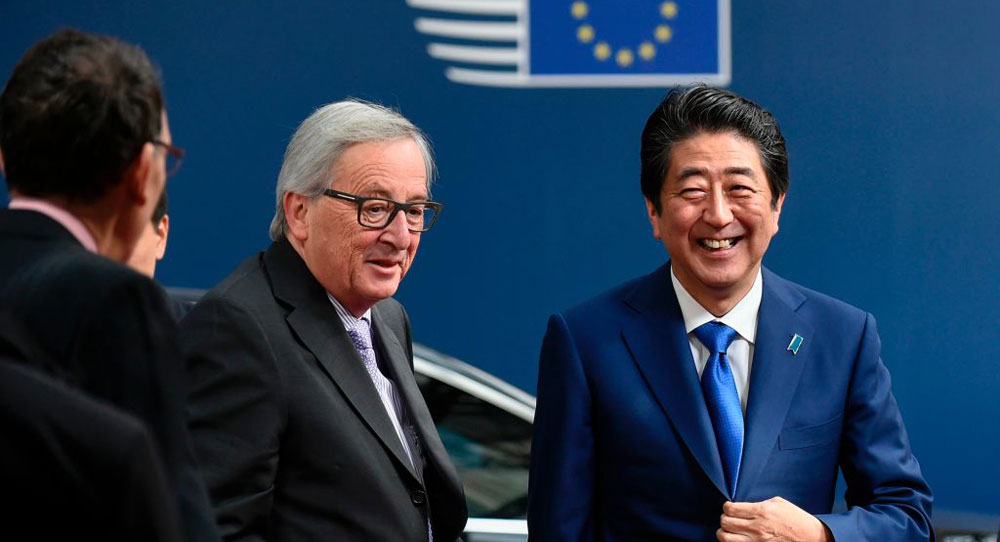Judy Dempsey
{
"authors": [
"Judy Dempsey"
],
"type": "commentary",
"blog": "Strategic Europe",
"centerAffiliationAll": "",
"centers": [
"Carnegie Endowment for International Peace",
"Carnegie Europe"
],
"collections": [],
"englishNewsletterAll": "",
"nonEnglishNewsletterAll": "",
"primaryCenter": "Carnegie Europe",
"programAffiliation": "",
"programs": [],
"projects": [],
"regions": [
"Asia",
"Europe",
"East Asia",
"Japan",
"Western Europe"
],
"topics": [
"Foreign Policy",
"EU",
"Economy",
"Climate Change",
"Trade"
]
}
Source: Getty
Europe Woos Japan
The EU seems determined to clinch a trade accord with Japan by the end of 2017. That might be wishful thinking.
How France, Germany, Italy, and the EU rolled out the red carpet for Shinzo Abe. During his whistle-stop tour of some of Europe’s largest economies and the Brussels-based institutions on March 19–22, the Japanese prime minister was given the royal treatment. European leaders said they wanted a trade accord with Japan, all the more so given the protectionist policies of the administration of U.S. President Donald Trump.
Those policies hit this side of the Atlantic on March 17–18, when G20 finance ministers failed during a meeting in Germany to agree on a statement to repudiate protectionism. The Trump administration seems intent on rolling back free trade. So do several populist leaders in Europe, including the leader of France’s National Front, Marine Le Pen, who is making a bid to become the country’s next president.
Free trade matters to the EU. As Patricia Wruuck, a trade analyst at Deutsche Bank Research, wrote in a report in January, the EU is the world’s largest trader in goods and services. It ranks second in imports and is number one when it comes to exports. “It is hard to overstate the importance of trade policy for Europe,” she argued. As it is, the EU and Japan together account for more than one-third of the world’s GDP.
But free trade is not just about facilitating the unhindered flow of goods between countries. It is also about adopting common standards.
When Jean-Claude Juncker, the president of the European Commission, met Abe, he spelled out as clearly as he could what a trade deal between the EU and Japan would mean. “We believe this agreement is necessary, it is necessary because we believe in free, fair and rules-based trade. And so we will continue to look out towards the world, rather than return to isolationism. The European Union is open for business – for fair business. . . . Following our discussions today, I am very confident this will pave the way for a swift agreement this year.”
That may be hard to achieve. The EU—and certainly Germany—is approaching trade negotiations from a different perspective from Japan. During the early stages of the talks that began in 2013, the EU wanted Japan’s three railroad companies, which are 100 percent privatized, to be placed under the government’s procurement rules. “European companies do not want Japanese railway companies entering the European market,” said Hosuk Lee-Makiyama, director of the European Centre for International Political Economy. Tokyo did not oblige.
Japan, for its part, clearly sees the benefits of forging a trade accord with the EU. It’s a big and lucrative market. But Tokyo has had other trade priorities. Japan was bitterly disappointed when the Trump administration tore up the Trans-Pacific Partnership (TPP), which would have bound the United States and several countries in the region into a special trade relationship with strategic implications.
Tokyo now fears that China will fill that vacuum in Southeast Asia. That is why Abe was so quick to visit Trump soon after he entered the White House on January 20. Japan wants a bilateral trade deal with the United States, and not just because it would give Japanese businesses access to the U.S. market at a time when Trump wants to heavily invest in infrastructure.
“Japan had put TPP first,” Lee-Makiyama said. “That alliance with the United States had regional implications for regional integration. It also has a high security imperative, which Europe cannot provide in the Asia-Pacific region.”
So while some EU governments might balk at Tokyo’s attempts to negotiate a bilateral trade deal with Washington, it has nothing to do with Japan’s unswerving commitment to multilateralism or globalization. Such a trade deal has security implications for a country that fears the unstoppable rise of China and growing uncertainty in the Korean Peninsula.
As for doing a deal with Europe, it is increasingly in Japan’s interests to maintain and increase its access to the EU’s single market, in case Europe turns more protectionist.
Given what is happening to U.S. trade policy, this is a chance for the EU and its member states to speed up or ratify trade accords not only with Japan but also with Singapore and New Zealand. Doing so is in Europe’s strategic and economic interests. But as Wruuck warned in her report, “EU trade policy risks being caught up between domestic and global challenges at the moment.” It’s going to require political will and strategic foresight to clinch the deal with Japan and prevent the contagion of U.S. protectionism.
About the Author

Nonresident Senior Fellow, Carnegie Europe
Dempsey is a nonresident senior fellow at Carnegie Europe
- Europe Needs to Hear What America is SayingCommentary
- Babiš’s Victory in Czechia Is Not a Turning Point for European PopulistsCommentary
Judy Dempsey
Recent Work
Carnegie does not take institutional positions on public policy issues; the views represented herein are those of the author(s) and do not necessarily reflect the views of Carnegie, its staff, or its trustees.
More Work from Strategic Europe
- Europe on Iran: Gone with the WindCommentary
Europe’s reaction to the war in Iran has been disunited and meek, a far cry from its previously leading role in diplomacy with Tehran. To avoid being condemned to the sidelines while escalation continues, Brussels needs to stand up for international law.
Pierre Vimont
- Taking the Pulse: Can European Defense Survive the Death of FCAS?Commentary
France and Germany’s failure to agree on the Future Combat Air System (FCAS) raises questions about European defense. Amid industrial rivalries and competing strategic cultures, what does the future of European military industrial projects look like?
Rym Momtaz, ed.
- Macron Makes France a Great Middle PowerCommentary
France has stopped clinging to notions of being a great power and is embracing the middle power moment. But Emmanuel Macron has his work cut out if he is to secure his country’s global standing before his term in office ends.
Rym Momtaz
- How Europe Can Survive the AI Labor TransitionCommentary
Integrating AI into the workplace will increase job insecurity, fundamentally reshaping labor markets. To anticipate and manage this transition, the EU must build public trust, provide training infrastructures, and establish social protections.
Amanda Coakley
- Can Europe Still Matter in Syria?Commentary
Europe’s interests in Syria extend beyond migration management, yet the EU trails behind other players in the country’s post-Assad reconstruction. To boost its influence in Damascus, the union must upgrade its commitment to ensuring regional stability.
Bianka Speidl, Hanga Horváth-Sántha










